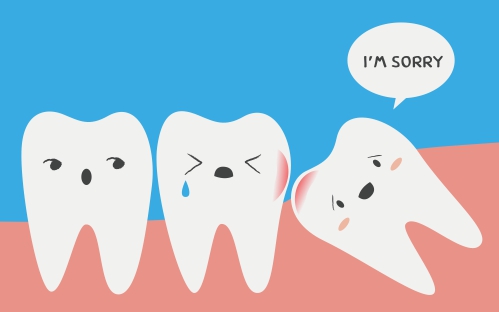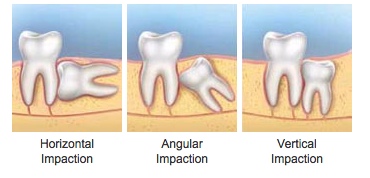Emergency Dentist | All You Need to Know About Wisdom Teeth
By Arthur Kezian
Wisdom Teeth:
Our mouths go through changes as we grow older, and one of those changes that come with age are wisdom teeth. Wisdom teeth usually appear from the ages of 17 – 25. Some patients have wisdom teeth that are fully erupted, while others may have only partially erupted wisdom teeth. Some patients only get two wisdom teeth instead of four, and in some rare cases, some patients may have more! Everyone’s anatomy is different, which is why some people have recommendations from their dentists to have the wisdom teeth extracted while some others can leave the wisdom teeth as is given they have enough space or are not causing harm.
Problematic Wisdom Teeth:

Some wisdom teeth don’t have enough room to grow though, and these wisdom teeth may need to be removed. Some teeth may be impacted, meaning, they are trapped within the gums. As they slowly start to peak out, your dentist will let you know if they need to be removed. The reasons for the removal can be because the teeth may not grow in the right position, allowing food to be trapped – eventually causing cavities. Sometimes they may crowd or even slightly damage the teeth that are next to them. In some cases too, they can cause a cyst which can damage nearby tooth roots or general bone level.
A lot of times wisdom teeth can cause pain, infection, swelling, or gum disease. In cases like these, sometimes an emergency dentist is required to help alleviate your discomfort.
Wisdom Teeth Removal:
Oral Surgery:

Before opting for removal, your dentist will take the necessary X-Rays to make sure the procedure is best suited for you and your case. He or she will also do a proper, close examination and clinical diagnosis to make sure if the the tooth must really have to be extracted. If the decision is made, the extraction will be done with anesthesia. Some dentists may refer you to oral surgeons depending on the case.
Oral surgeons can remove all four teeth at the same time while you are under general anesthesia. This way you don’t feel a thing and when you wake up, the teeth are already removed. This is a great option for patients who have riskier extractions. It is also great for patients who have a phobia of the dentist, or needles. But, because this surgery is much more invasive, the healing also takes longer and some patients experience more pain. Don’t worry though, the surgeon can prescribe you pain pills and antibiotics to help with the healing!
In-Office Extraction:
For patients who want a quicker turn around time, and don’t mind getting local anesthesia, the procedure can be done in about thirty-forty five minutes. This type of extraction though usually tackles one to two teeth at a time. You will be given the local anesthetic specifically in the area the dentist will be working on, and once you’re numb, the tooth will be taken out. After the procedure, you can still drive home, function properly, and the pain level usually tends to be less. Some patients may still feel some pain though, so just as a surgeon can, your general dentist can also prescribe you pain pills and antibiotics to help with the healing!
All in all, extractions are not as bad as they sound or seem. Sometimes removing the tooth actually helps patients and relieves them from the pain they may have been experiencing from the wisdom teeth. It is important for you to make a consultation with your dentist and discuss which option would be best for you, because everyone’s case is so different. If you would like to make a consultation at our office, feel free to give us a call at (323) 467-2777. Our staff will be delighted to help you and put you at ease about the procedure you may need.
Dr. Arthur A. Kezian DDS 443 N. Larchmont Blvd Los Angeles, CA 90004 (323) 467-2777
